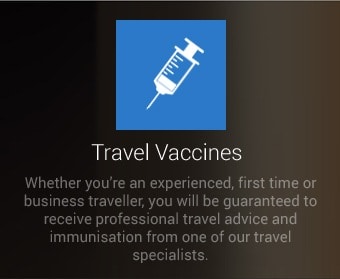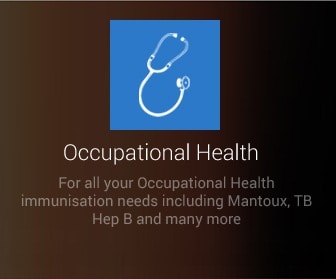Travel Vaccination |
Malaria |
Malaria
What you need to know about Malaria
Malaria is a common, serious and sometimes fatal disease caused by a parasite that is spread by mosquitoes.
Mosquitoes that contain the Malaria parasite typically bite from dusk to dawn. People who get Malaria are typically very sick with high fevers, shaking chills, and flu-like illness.
Although Malaria can be a deadly disease, illness and death from Malaria can usually be prevented.
High-risk areas
The regions affected by Malaria are tropical and subtropical countries surrounding the equator world-wide, including:
- The Caribbean
- Central and South America
- The Middle East
- South and South East Asia
- South Pacific and Oceania
- Sub-Saharan and Northern Africa
Signs and symptoms
Malaria symptoms may appear as soon as a week or sometimes is delayed to several months before symptoms appear, depending on the Malaria parasite causing infection.
The less serious Malaria symptoms are flu-like, such as headaches, fever, muscle and joint aches, chills, sweats and diarrhoea
The more serious Malaria symptoms can include:
- Seizures
- Coma
- Kidney and respiratory failure
- Shock which may in occasional cases lead to death if untreated
Prevention
Avoiding malaria involves several steps, known as the ‘ABCD’ of malaria prevention:
- Awareness of risk: know your risk of malaria.
- Bite prevention: avoid bites as much as possible.
- Chemoprophylaxis: take the right anti-malarial tablets.
- Diagnosis: get immediate medical help for symptoms.
To avoid bites, protect yourself with an insect repellent containing DEET. This can be sprayed on exposed skin and clothing. It is also recommended to wear clothing that covers the arms and legs where possible. You can also consider using nets or stay in screened or air-conditioned accommodation. For high risk travellers (Trans-Africa) consider Permethrin impregnated clothing and nets.
There are several anti-malarial drugs that can be used as a preventative measure to help avoid Malaria symptoms if infected. These often need to be taken before, during and after your trip.
The prophylactic effect of anti-malarials does not begin immediately upon initiating the treatment. Travellers visiting areas with Malaria risk, will usually begin taking the anti-malaria medication 1-2 weeks before entering the endemic area, and must continue taking them for 4 weeks after leaving the area (with the exception of Malarone (Atovaquone/Progaunil) that only needs to be started 2 days prior, and continued for a week afterwards).
Malaria parasites in some regions have developed resistance to certain anti-malarial drug treatments, so please consult our travel specialists for more information. Our travel specialists can recommend the most suitable option for you based on your specific health requirements, itinerary, past history and time to travel.
| Vaccination | Price* | ||
| Prescription FEE | FREE | ||
| Atovaquone/Proguanil 250mg/100mg (Malarone Generic) Tablets | £2.50 per tablet | ||
| Atovaquone/Proguanil 62.5mg/25mg (Paediatric) Tablets | £1.50 per tablet | ||
| Malarone Tablets | £3.50 per tablet | ||
| Malarone 62.5mg/25mg Paediatric Tablets | £1.50 per tablet | ||
| Doxycycline 100mg Capsules | £0.70 per capsule | ||
| Mefloquine Hydrochloride 250mg (Lariam) Tablets | £3.50 per tablet | ||
| Proguanil 100mg (Paludrine) Tablets | £0.30 per tablet | ||
| Chloroquine 250mg (Avloclor) Tablets | £0.30 per tablet | ||
| Paludrine/Avloclor Travel Pack | £15.99 per pack of 98 | ||
| *Price per tablet. | |||
| PLEASE NOTE: All medication is non-refundable, non-returnable and cannot be exchanged. | |||
|
*Price per dose. Please see the dosage to calculate the overall cost. *Prices are subject to change please contact us for the latest pricing. |
|||





